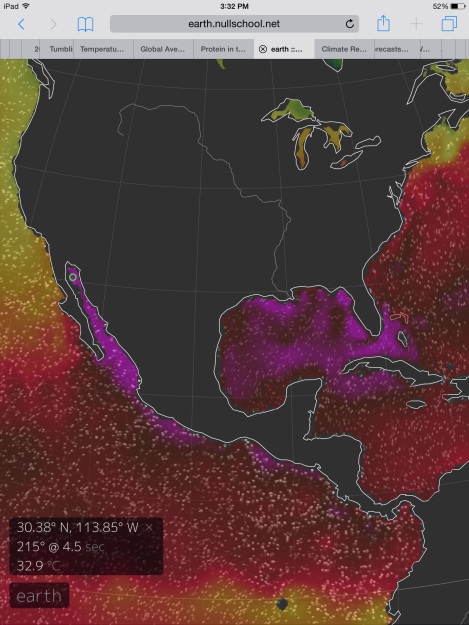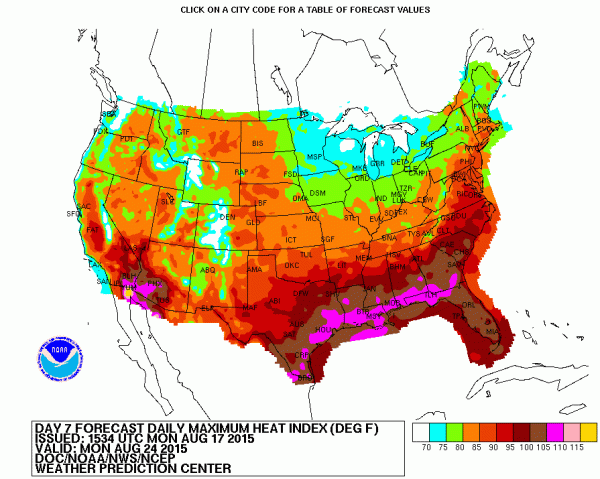Dangerous Heat Sets Sights on Southern United States
17
August, 2015
High
wet bulb temperatures and related heatwave mass casualty events have
spanned the globe during the record hot summer of 2015.
Now, it appears the Southern United States is also falling under the
gun of life-threatening heat and humidity.
Gulfs
of Mexico, California Host Screaming Sea Surface Temperatures
As
with so many recent heatwaves with the potential to produce mass
casualty events, the story starts with sea surface temperatures in
excess of 30 degrees Celsius (86 Fahrenheit). And across a broad
region of the Gulf of Mexico and all throughout the Gulf of
California ocean surface waters now feature temperatures in the range
of 30 to 33 degrees C (86 to 91 F).
(A
tell-tale pool of 30 C+ water is gathering in the Gulfs of Mexico and
California. Such hot water is a support for deadly wet-bulb readings
in the range of 30-33 C. Image source: Earth
Nullschool.)
These
are waters warmed by increasingly vicious human hothouse conditions.
A world ocean facing a global fever that is 1 degree C (1.8 F) hotter
than the more placid, less dangerous temperatures of 135 years ago.
In
the Gulfs of Mexico and California, this heat has concentrated —
pushing the waters there into 1-4 C above average ranges. Generating
a dangerous reservoir of latent heat. One featuring ocean
temperatures similar to those that kicked off heatwave mass casualty
events in India, Pakistan, Japan and Egypt this
summer. But this feature of the human hothouse is now focusing in on
the Southern US — creating conditions that are increasing the risk
of heat stress, heat injury and possibly loss of life.
The
steaming waters of our southern gulfs will feed dangerously high wet
bulb temperatures throughout a large region from the Carolinas to
Florida through the Gulf States and on into the Southwest over the
coming days and weeks. Ocean temperatures hot enough to supportwet
bulb readings
in the range of 30 to 33 degrees Celsius. Dangerous levels very close
to the maximum human threshold of 35 C.
NOAA
Predicts Heat Indexes to Skyrocket
Concordantly,
a similar measure used to determine how hot it feels outside is set
to skyrocket throughout the southern US over coming days. In many
regions heat
indexes are
predicted to exceed 100, 105, 115 or even 120 degree readings.
(Forecast
heat index map for Monday, August 24. Over the next seven days, heat
index values are predicted to remain in dangerous ranges across large
sections of the Southern United States. Image source: NOAA.)
Regions
at greatest risk include Southern California, Arizona, and the Gulf
Coast states of Texas, Lousiana, Mississippi, Alabama, Georgia and
Florida.
Heat
index values in excess of 105 F (40 C) are considered dangerous.
Those crossing a 127 F (53 C) threshold are considered exceedingly
dangerous. The NOAA forecast now includes dangerous heat indexes
predicted for the above regions lasting for at least the next seven
days. And with sea surface temperatures likely to remain much hotter
than average near the area of highest impact through the end of
August, these high-risk heat conditions have the potential to
continue for some time.
Links:
Hat
tip to DT Lange





No comments:
Post a Comment
Note: only a member of this blog may post a comment.